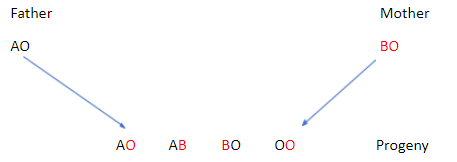
Blood group of the father is A and the blood group of mother is B. Then predict the blood group of the progeny.
A) A, AB
B) A,B, AB,O
C) B,AB
D) B, AB
Answer
573.6k+ views
Hint:The progeny can have any blood group which may consist of both universal donor as well as universal recipient. Parental blood group also shows its inheritance.
Complete answer:
The ABO antigens are the oligosaccharides (carbohydrate) present on the membrane of the Red blood cells (erythrocytes). Presence or absence of the A or B antigen over the membrane of RBC determines the blood group of individuals. Individuals of type A blood group possess the A antigen and antibody against B, while individuals of type B blood group carry antigen B and antibody against A. AB individual carries both the antigen but antibody is absent. Therefore, it is called a universal blood acceptor. The individual with O blood is called a universal donor because it does not carry any antigen with them while it carries antibodies Anti A and Anti B. Blood group is an inherited property involving the contribution of both the parents.
There are two most common types of blood group systems i.e. ABO and Rh factor determine the individual’s blood group (A, B, AB,O with + or -). Checking the blood group before blood transfusion is essential because mismatch of blood groups can lead to fatality.

Here, father is having Blood group A, it is carrying the A and O antigen, while antibody B. mother is carrying the B and O antigen, while antibody against the A antigen. Their progeny can inherit antigen A from father, or antigen B from the mother or antigen O from both of them. So, progeny has all the possibilities to carry any of the blood groups.
Thus, the correct answer is Option B. i.e. A, B, AB, O
Note:The antigen present on the membrane of RBCs determines the blood group of an individual and does not carry the antibody against that antigen. Blood group AB is called a universal recipient whereas O group is universal donor.
Complete answer:
The ABO antigens are the oligosaccharides (carbohydrate) present on the membrane of the Red blood cells (erythrocytes). Presence or absence of the A or B antigen over the membrane of RBC determines the blood group of individuals. Individuals of type A blood group possess the A antigen and antibody against B, while individuals of type B blood group carry antigen B and antibody against A. AB individual carries both the antigen but antibody is absent. Therefore, it is called a universal blood acceptor. The individual with O blood is called a universal donor because it does not carry any antigen with them while it carries antibodies Anti A and Anti B. Blood group is an inherited property involving the contribution of both the parents.
There are two most common types of blood group systems i.e. ABO and Rh factor determine the individual’s blood group (A, B, AB,O with + or -). Checking the blood group before blood transfusion is essential because mismatch of blood groups can lead to fatality.

Here, father is having Blood group A, it is carrying the A and O antigen, while antibody B. mother is carrying the B and O antigen, while antibody against the A antigen. Their progeny can inherit antigen A from father, or antigen B from the mother or antigen O from both of them. So, progeny has all the possibilities to carry any of the blood groups.
Thus, the correct answer is Option B. i.e. A, B, AB, O
Note:The antigen present on the membrane of RBCs determines the blood group of an individual and does not carry the antibody against that antigen. Blood group AB is called a universal recipient whereas O group is universal donor.
Recently Updated Pages
Master Class 12 Economics: Engaging Questions & Answers for Success

Master Class 12 Physics: Engaging Questions & Answers for Success

Master Class 12 English: Engaging Questions & Answers for Success

Master Class 12 Social Science: Engaging Questions & Answers for Success

Master Class 12 Maths: Engaging Questions & Answers for Success

Master Class 12 Business Studies: Engaging Questions & Answers for Success

Trending doubts
Which are the Top 10 Largest Countries of the World?

What are the major means of transport Explain each class 12 social science CBSE

Draw a labelled sketch of the human eye class 12 physics CBSE

What is a transformer Explain the principle construction class 12 physics CBSE

Why cannot DNA pass through cell membranes class 12 biology CBSE

Differentiate between insitu conservation and exsitu class 12 biology CBSE




